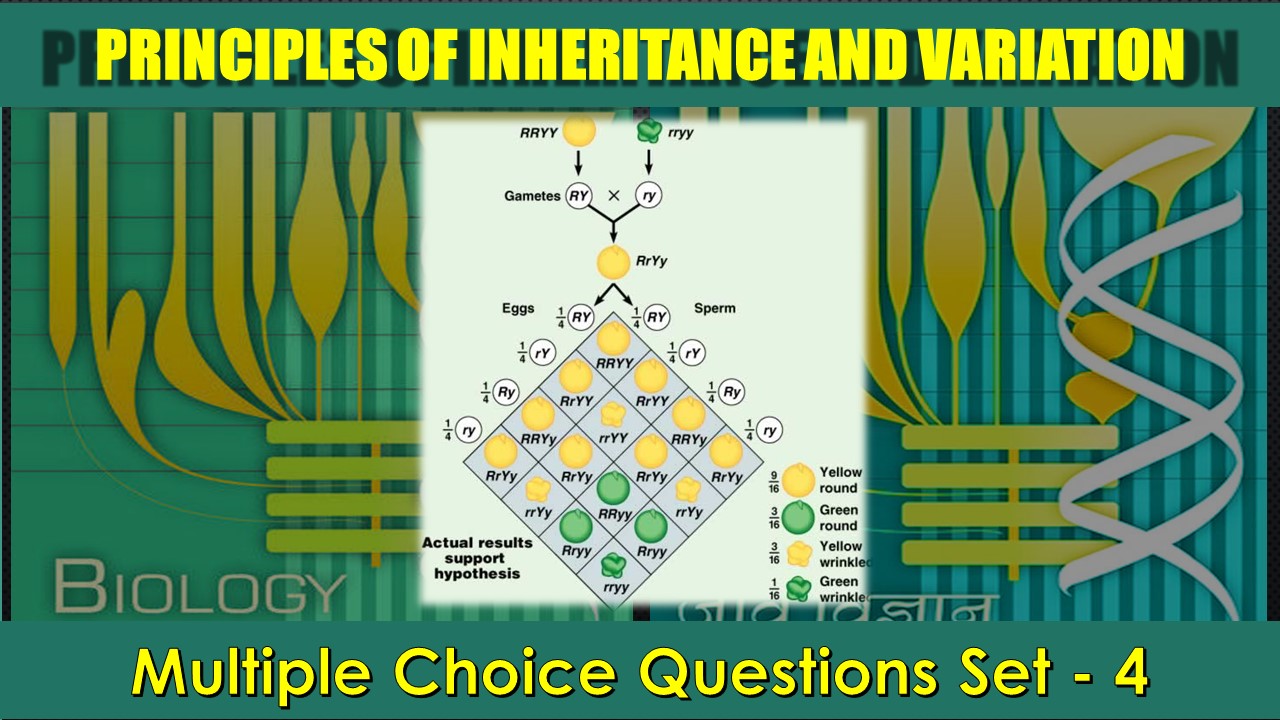CBSE Class 12 Principles of Inheritance and Variation Multiple Choice Questions with Answers. MCQ Questions Class 12 Principles of Inheritance and Variation with Answers Is Prepared Based on Latest Exam Pattern. Students can solve NCERT MCQ questions Class 12 Principles of Inheritance and Variation with Answers to know their preparation level.
Students who are searching for NCERT MCQ Questions Class 12 Principles of Inheritance and Variation with Answers are compiled here to get good practice on all fundamentals. Know your preparation level on MCQ Questions for Class 12 Principles of Inheritance and Variation with Answers. You can also verify your answers from the provided MCQ Class 12 Principles of Inheritance and Variation with Answers. So, ace up your preparation with MCQ of Class 12 Biology Examinations.
MCQ Questions Class 12 Principles of Inheritance and Variation with Answers - Set - 4
Question 1:
In a genetic cross having recessive epistasis, F2 phenotypic ratio would be
(a) 9 : 6 : 1
(b) 15 : 1
(c) 9 : 3 : 4
(d) 12 : 3 : 1.
Correct Answer – (C)
Question 2:
Mendel’s last law is
(a) segregation
(b) dominance
(c) independent assortment
(d) polygenic inheritance.
Correct Answer – (C)
Question 3:
F2 generation in a Mendelian cross showed that both genotypic and phenotypic ratios are same as 1 : 2 : 1. It represents a case of
(a) co-dominance
(b) dihybrid cross
(c) monohybrid cross with complete dominance
(d) monohybrid cross with incomplete dominance.
Correct Answer – (D)
Question 4:
Multiple alleles are present
(a) at the same locus of the chromosome
(b) on non-sister chromatids
(c) on different chromosomes
(d) at different loci on the same chromosome
Correct Answer – (A)
Question 5:
Which of the following condition is called monosomics
a) 2n+1
b) 2n+2
c) 2n-1
d) n+1
Correct Answer – (C)
MCQ Questions Class 12 Principles of Inheritance and Variation With Answers
Question 6:
In Antirrhinum two plants with pink flowers were hybridized. The F1 plants produced red, pink and white flowers in the proportion of 1 red, 2 pink and 1 white. What could be the genotype of the two plants used for hybridisation? Red flower colour is determined by RR and white by rr genes.
(a) rrrr
(b) RR
(c) Rr
(d) rr
Correct Answer – (C)
Question 7:
The genotype of a plant showing the dominant phenotype can be determined by
(a) test cross
(b) dihybrid cross
(c) pedigree analysis
(d) back cross.
Correct Answer – (A)
Question 8:
A tall true breeding garden pea plant is crossed with a dwarf true breeding garden pea plant. When the F1 plants were selfed the resulting genotypes were in the ratio of
(a) 3 : 1 : : Tall : Dwarf
(b) 3 : 1 : : Dwarf : Tall
(c) 1 : 2 : 1 : : Tall homozygous : Tall heterozygous : Dwarf
(d) 1 : 2 : 1 : : Tall
Correct Answer – (C)
Question 9:
Experimental verification of the chromosomal theory of inheritance was done by
(a) Mendel
(b) Sutton
(c) Boveri
(d) Morgan.
Correct Answer – (D)
Question 10:
Test cross is a cross between
a) Hybrid x Dominant parent
b) Hybrid x Recessive parent
c) Hybrid x Hybrid
d) Dominant parent x Recessive parent
Correct Answer – (B)
- NCERT Solutions Class 11 Chemistry Chapter 1 : Some Basic Concepts of Chemistry
- NCERT Solutions Class 11 Chemistry Chapter 2 : Structure Of The Atom
- NCERT Solutions Class 11 Chemistry Chapter 3 : Classification of Elements and Periodicity in Properties
- NCERT Solutions Class 11 Chemistry Chapter 4 : Chemical Bonding and Molecular Structure
- NCERT Solutions Class 11 Chemistry Chapter 5 : States of Matter
- NCERT Solutions Class 11 Chemistry Chapter 6 : Thermodynamics
- NCERT Solutions Class 11 Chemistry Chapter 7 : Equilibrium
- NCERT Solutions Class 11 Chemistry Chapter 8 : Redox Reactions
- NCERT Solutions Class 11 Chemistry Chapter 9 : Hydrogen
- NCERT Solutions Class 11 Chemistry Chapter 10 : The s-Block Elements
- NCERT Solutions Class 11 Chemistry Chapter 11 : The p-Block Elements
- NCERT Solutions Class 11 Chemistry Chapter 12 : Organic Chemistry: Some Basic Principles and Techniques
- NCERT Solutions Class 11 Chemistry Chapter 13 : Hydrocarbons
- NCERT Solutions Class 11 Chemistry Chapter 14 : Environmental Chemistry




